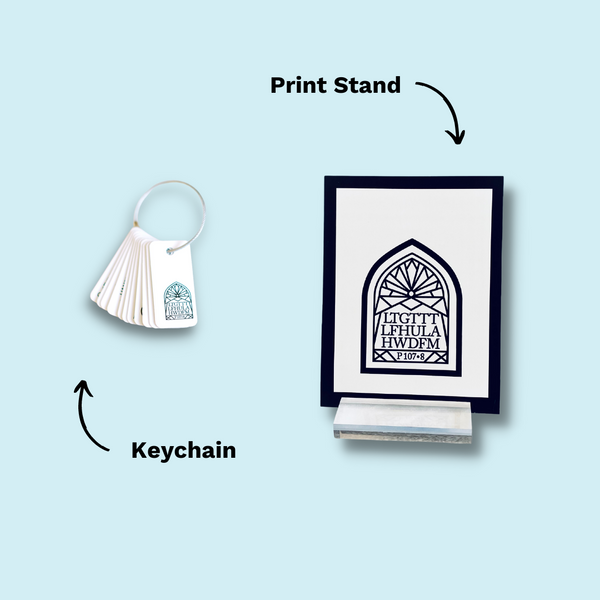"Be joyful in hope, patient in affliction, faithful in prayer." — Romans 12:12
What a great verse for the new year! “Be joyful in hope, patient in affliction, faithful in prayer” (Romans 12:12). It’s a triad of short, hopeful goodness that we all want to be true of our lives. And as we look ahead at the coming year, what better words could we have than these on the tips of our tongues and rattling around in our heads and hearts? Who doesn’t want to focus on concepts like joy or hope or patience or prayer? At first glance, these seem like light and easy possibilities, and yet as I’ve stooped down to investigate them, as I’ve labored to pick them up and roll them over in my mind, I’ve found them quite heavy and even burdensome. How could words like joy and hope be so weighty?
As I think about my own life, my own hopes and dreams, my hard things, my long-term prayers, I have to confess that these commands challenge my heart. They aren’t simple phrases, simply done. Instead, they are gritty and deep. They make me wonder how I can grab hold of joy as I wait for unfulfilled hopes, how I can endure the harder things in life with grace-filled patience, and how I can honestly and faithfully go to God again and again and give him all my long-term longings.
Are you starting to feel the weight of it too? These words can feel impossibly weighty for us, yet we know from Scripture that God never commands something he doesn’t also enable. So that’s where we’re going: to Scripture, the very words of God, to find out how we can live like this. Today, and in the following two weeks, we’re going to take each phrase in turn. We’re going to discover the secret to being joyful in hope, patient in affliction, and faithful in prayer.
Can we find joy in our "not yets" and "nevers"?
“Be joyful in hope.” This is our first command. Yes, it’s a command. And honestly, I can’t imagine telling someone to do this—someone who’s in the very thick of waiting, someone who’s longing for something that hasn’t yet happened (and may never happen). I can’t even create joy in my own soul, so how can I say to someone else, “Be joyful in hope”? And yet, here it is. Thankfully, I’m not the one commanding it, God is. And if it’s coming from him, we know it must be wise and for our ultimate good. It must be the very thing our souls need as they wait in hope.
We need joy.
Hoping is human, but I’d argue that being joyful in hope is divine. We’re accustomed to hoping for things we don’t yet see or experience. In fact, we really do live in a constant state of hoping—waiting for that thing, hoping for the best outcome, longing for a better way. Our lives and our livelihoods are tied up in ceaselessly veiled uncertainties, and when we really consider it, it can make us feel incredibly vulnerable. We can easily slip into despair, get tangled up in worry, and even break under the magnitude of the endless possibilities of our hopes. We need a better way, we need joy! But who can muster up lasting joy in the face of uncertainty? In our own strength, it’s impossible. And yet, God says, “Be joyful in hope.” How can God demand the impossible from us?
God must make the impossible possible.
And this is exactly what we find in the whole letter of Romans. In it, God himself is continually making the impossible possible! He brings dead things to life, makes enemies into friends, turns sinners into saints, and we see that he also gives joy in uncertainty. We see this joyful hope expounded on in two specific places in the letter: chapters 5 and 8. Our verse is just a shorthand reference back to these explanations. We’re only going to tackle one of them here, but you can listen to this podcast episode for a fuller explanation of both.
In Romans 5, Paul tells us where our joyful hope is rooted. He says, “Therefore, since we have been justified by faith, we have peace with God through our Lord Jesus Christ. Through him we have also obtained access by faith into this grace in which we stand, and we rejoice in hope of the glory of God” (Romans 5:1–2, ESV, emphasis mine). Did you hear that?! This is the reason for our joyful hope: God has done the impossible on our behalf. Though we deserve condemnation and alienation, through faith in Jesus we’ve been given peace with God and access to his grace. How can we not be joyful in this hope? And our joy is safe because our ultimate and foundational hope is based on the unchanging glory of God.
But what about all of our right-now hopes?
What does this mean for them? Surely, the most significant hope we have is in the fully-realized, forever, face-to-face relationship with our Savior God. But does this greatest hope dwarf our current hopes into insignificance? Or perhaps this ultimate hope somehow informs our right-now unfulfilled hopes and gives us joy in them? As I was pondering these questions, I made a list of all of my right-now hopes, and tried to see them through the lens of my greatest hope in Jesus.
This little exercise answered my questions entirely.
Let me elaborate. I wrote out a list of all my hopes and dreams and goals for the coming year. Then I went through each item on the list and next to each one I wrote, “Jesus, my hope is in you.” I wanted to see each hope through the lens of my greatest hope. And do you know what happened? I was comforted, challenged, and changed. I was comforted in so many of my hopes, seeing relationships and situations through the lens of my only true hope: Jesus. I was challenged as I realized I had placed false hopes in things like vacations or time with family. As I saw them through the lens of Jesus, I was able to reorient my hope. And finally, I was changed as I realized there were hopes on my list that were no hope at all, just hollow promises of happiness. I realized that filtering my right-now hopes through the lens of my greatest hope helps me see them rightly and even find joy in them. This is what I learned:
All of my current hopes find their truest and final fulfillment in Jesus.
On the most recent episode of the Dwell Differently podcast, I chatted with Doug McKelvey and Andrew Peterson about Romans 12:12, and Doug’s words about why we can have hope even in the midst of struggle were so poignant: He said:
It’s only to the degree that we remember and cling to the person and promises of Jesus that it’s possible to be joyful when we don’t have the thing that we so long for, or to be patient in the midst of affliction, or to continue faithfully in prayer…all of those things only make sense in the context of a relationship and an expectation that this is not the end.
Amen. We need to see our right-now reality through the lens of our future hope.
What about you?
Are you living like the ending of the story is already true? What are your hopes for the coming year? I’d encourage you to write them down. Then, next to each hope, write: “Jesus, my hope is in you.” See if you aren’t comforted, challenged, and changed in your perspective and priorities. And see if you don’t start to realize and grasp hold of the joy that is yours in your greatest hope, Jesus.




